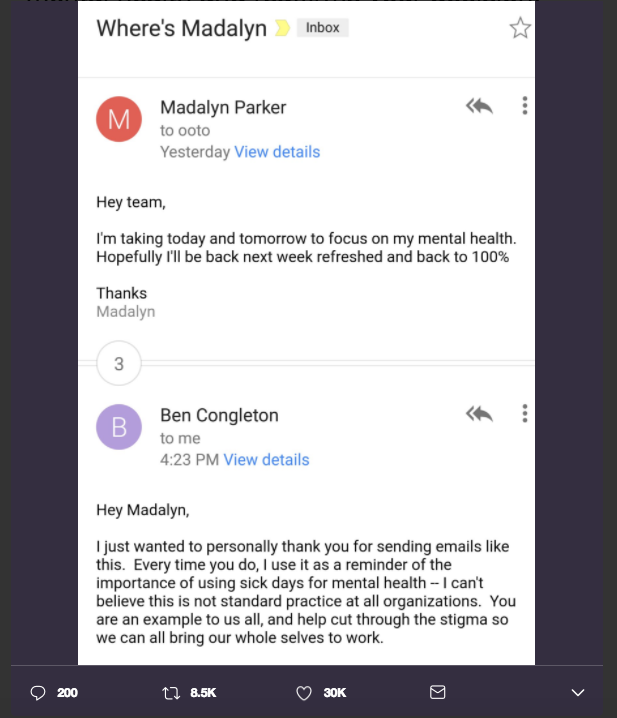One Woman's Brave Email is Helping to Break the Mental Health Stigma

By:
We've all heard that we should take a mental health day from time to time, but how many of us are brave enough to actually take one—and let our coworkers and boss know that mental health issues may be the reason for being out of office?
 eflon/Flickr - flic.kr
eflon/Flickr - flic.kr
Well, Madalyn Parker, a web developer, did exactly that in an email.
She sent an email to her team letting them know she was taking two days off "to focus on my mental health"—and was shocked by the CEO's response.
She tweeted the email exchange, where it has over 30,000 likes and 8,400 retweets.
 Madalyn Parker/Twitter - twitter.com
Madalyn Parker/Twitter - twitter.com
Some were envious of the response:
Others didn't understand why Parker sent the email—so she explained why it's important to take care of your mental health and not shy away from talking about it:
Ben Congleton, the CEO who replied, was so stunned by the outpouring of support that he wrote about it on Medium.
"I wasn’t expecting the exposure, but I am so glad I was able to have such a positive impact on so many people," he wrote on July 6.
"There were so many stories of people wishing they worked at a place where their CEO cared about their health, and so many people congratulating me on doing such a good thing," he continues, adding:
It’s 2017. I cannot believe that it is still controversial to speak about mental health in the workplace when 1 in 6 americans are medicated for mental health.
Congleton is sourcing a Scientific American article from December 2016, which goes on to report that "just over one in 10 adults reported taking prescription drugs for 'problems with emotions, nerves or mental health,'" sourcing statistics from a piece published in JAMA Internal Medicine earlier that month.
A top highlighted quote from Congleton's Medium piece is "It’s 2017. We are in a knowledge economy. Our jobs require us to execute at peak mental performance. When an athlete is injured they sit on the bench and recover. Let’s get rid of the idea that somehow the brain is different."
It's even more difficult for people of color to not only receive mental health care, but to even discuss it.
HuffPost reported in October 2016, "according to the U.S. Department of Health and Human Services of Minority Health, black people are 10 percent more likely to report having serious psychological distress than white people. There’s a stigma when it comes to black men talking about their mental health."
And it isn't just about stigma. They continue: "Despite being disproportionately affected by mental health conditions, black men in America have to deal with a lack of health care resources, a higher exposure to factors that can lead to developing a mental health condition, a lack of education about mental health and other factors that serve as barriers to getting proper help."
It's also more difficult for people of color to feel as though others—even medical professionals—can relate to their mental health care; "African-Americans make up less than 2 percent of American Psychological Association members, according to a 2014 survey," Mic reports. Even more, "Latinos are less likely to report mental illness," with very few Latinos actually seeking help, according to Latina.
Which is why it's so helpful and important for people like Congleton and Parker to speak openly about the need to take care of mental health.
"What if we talked about physical health the absurd way we talk about mental health?" ATTN: asked in a video posted on May 26.
Parker wrote about her previous hurdles in navigating a job while handling anxiety and depression, noting, "I struggle with illness. Just as the flu would prevent me from completing my work, so do my depression and anxiety."
Her point is valid, mental and physical health are treated differently. As the video shows, you wouldn't tell someone with a broken leg, "it's like you're not even trying to walk." Why do we do the same thing to people suffering from mental conditions?
